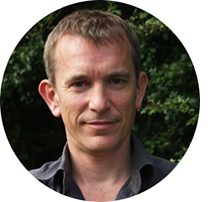For our first nature-writing competition, hundreds of budding writers, aged from 9 to 90, sent us beautiful entries written with passion and skill. Here, our features editor Joe Pontin introduces the judges' favourite.
The outdoors calls to many of us. It’s the place we feel free, where many of us find peace – and never more so than in the lockdowns of the past 18 months. The theme of our first New Nature Writer of the Year competition, Escape to Nature, allowed budding writers to explore the connection between our sense of freedom and wild open places.
There were startling moments of intimacy with the wild, when you locked gaze with a deer, a fox or a hare. Moments of reflection, when you found something in yourselves that you had never known, or that you had forgotten. In particular, the passage of time was on your minds; some of you ruminated nostalgically on a newly rediscovered love for nature that had lain dormant since childhood.
For many of the writers, loss was a theme, especially bereavement – unsurprisingly, in a year when so many of us parted with loved ones.
As a judge, I can report that the cumulative experience of reading hundreds of such passionate entries had a powerful effect. More than once, I shed tears. This made the process of shortlisting difficult. We became attached to your stories, and many, many of those that did not quite make our shortlist were insightful, touching and original.
Fortunately, in considering an overall winner from the shortlist of 20, I was joined by three exceptionally talented nature writers: Stephen Moss, Katharine Norbury and Anita Sethi (for more information, scroll down to the end of this feature).
Together, the judges chose a winner that we felt fulfilled the brief most satisfyingly: to describe an aspect of the natural world that the entrant had witnessed in person; to evoke a vivid atmosphere and a strong sense of place; to describe the effect of this experience of the natural world.
The judges also named two outstanding runners-up, which you can read below, and four fabulous highly commended entries.
The judges' favourites – in brief
Winner
Caro Fentiman, Northumberland
Runners-up
Mike Gibson, North Yorkshire
Natalie Robins, Gloucestershire
Highly commended
June Elford, Isle of Wight
Rhiannon Law, Glasgow
Adele Prince, London
Samantha Pyrah, East Sussex
Whether you are on the list or not, we'd like to thank everyone who entered – and urge you to keep writing about nature and wild places.
So without further ado, read Caro's winning entry, followed by our two runners-up, and finally the judges' comments on our highly commended entries.
BBC Countryfile New Nature Writer of the Year 2021: Winner – Caro Fentiman, Northumberland
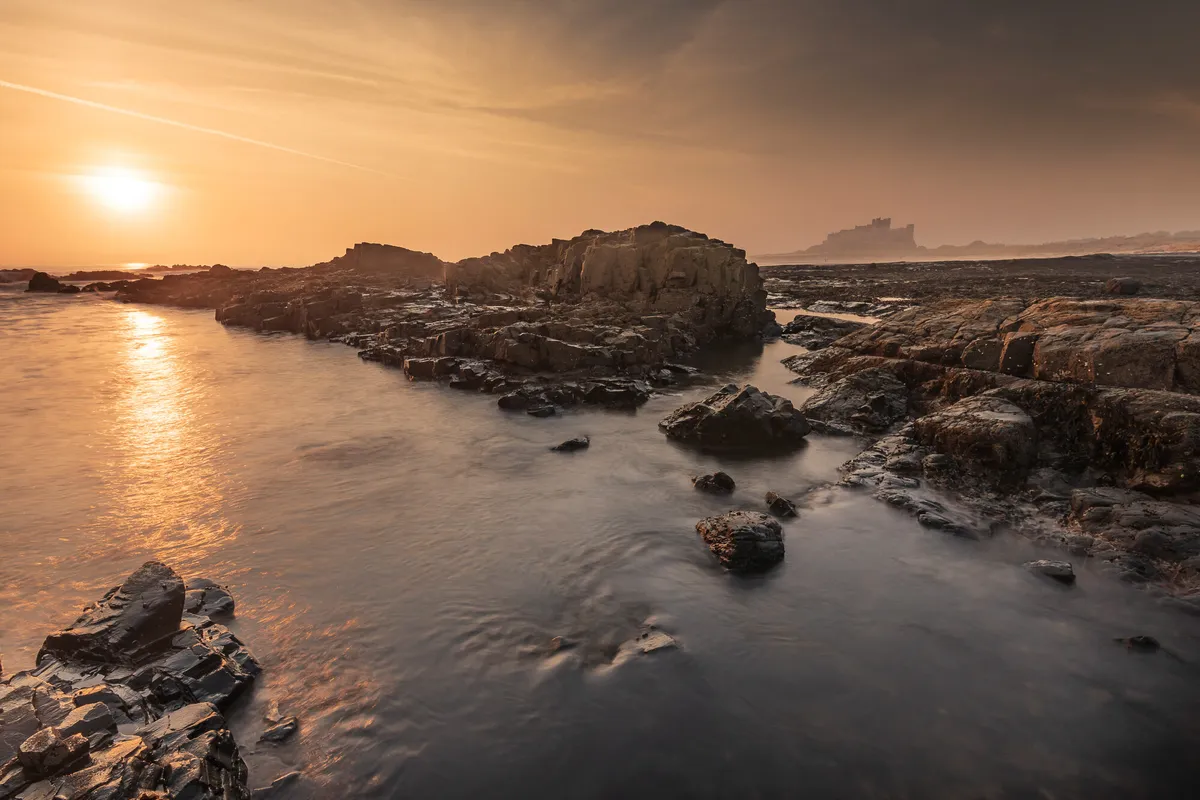
Poddler Pool
A white stag is painted on a crop of rocks below the lighthouse. When I see the antlers, flecked with rust-coloured algae, it means I am nearly there. Other people might want to turn back and marvel at Bamburgh Castle and the glossy beach below, but I’ve been here many times and know where the real treasure is hidden.
Poddler Pool lies at Black Rock Point, just before the white dazzle of Ross Sands. Gazing north, Lindisfarne Castle juts out on the horizon, and a swivel to the south reveals the Farne Islands, swelling with puffins in the summer months and a permanent home for colonies of grey seals. When the wind is blowing the right way, the ghostly moan of seal songs drifts across the water like a siren call.
To fully appreciate the joy of Poddler Pool, it is important to visit at low tide, when the water level is well below the brim. I would argue that this is the best swimming spot in the British Isles, an infinity pool in every sense of the word. The steep edges are hung with bladderwrack, covering a blanket of barnacles. The bottom of the pool is covered with large, rounded pebbles, rubbed sea-smooth. The perfect antidote to limpets.
Though the tide must be low, the weather can do what it likes, offering a different experience each time I visit. On a calm day, I carefully edge down into the pool: there is a natural step that makes lowering myself into the icy water a little less shocking. Rarely, the sun will have toasted my skin and taken the edge off the chill, and on those days there is nowhere nicer in the world. I push my body into the water, which possesses a strange, dense quality, and wrap it around me, rolling like a seal. Several sanderlings stand poised just metres away, ready to rise as one in an impressive monochrome display. Oystercatchers turn the world technicolour, carrot beaks glinting in the light. On these balmy days I swim up and down in a kind of trance, my heart rate dropping lower and lower, until I am completely inhabiting that moment and my whole world exists within these seaweed curtains.
In Northumberland you can’t rely on the weather to be clement, but the skies are always endless and it’s fun to watch clouds chase each other as gaps of blue emerge. On a slate-grey day, with the sharp wind baring its teeth, it is almost a relief to shelter in Poddler Pool, though the water has a bite of its own. Gannets smash into the waves while a crow lends me a beady eye from a nearby rock. The sea smudges into the sky so it’s hard to know where one ends and the other begins. And while I am lying on my back, white toes tingling, it doesn’t really matter. I am floating in a Turner painting.
There are days when even a low tide cannot protect Poddler Pool from the onslaught of splash and spray being hurled at it by the North Sea. There can be no meditative moments when I am surrounded by white noise and the Farne Islands are hidden behind a lingering mist. This is when the sea witch emerges, cackling and shrieking, diving amongst the sugar kelp, rocked by rogue waves tipping into the pool. Gulls circle overhead, buffeted by the wind, serenading me as I twist and spin in the churning brine.
Whatever the weather, I always leave a little piece of myself behind, emerging lighter somehow. As the white stag watches me walk away, I lick my lips and wear the salt on my skin like armour.
What the judges said:
A multi-sensory experience of the natural world, which invites the reader to become both companion and witness in a timeless account of the power of the sea.
Katharine Norbury
A powerful, luminous and beautifully-written evocation of repeated encounters with water and nature on the edge of land and sea. A worthy winner.
Stephen Moss
About the writer
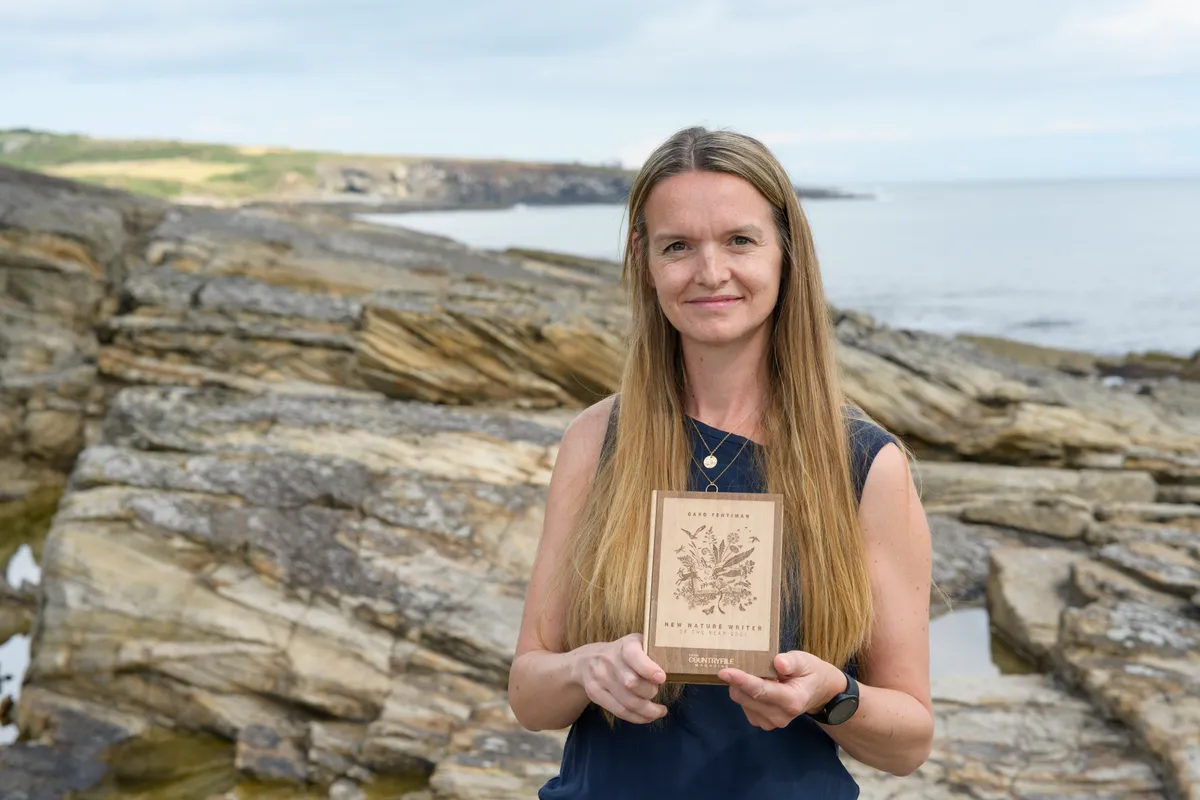
Caro Fentiman is from Northumberland – she's pictured above on the coast she loves, with her trophy. She has a background in theatre and education, and is now a musician and writer, focusing mainly on parenting and the arts.
Over lockdown she taught singing in fields and gardens, as well as recording her own songs on the beach while her children paddled. Caro lives with her four young daughters, and writes extensively about her experiences of raising them in a little town between the hills and the sea. She is currently writing a memoir about moons and motherhood.
“I am delighted to have had my nature writing acknowledged,” she said. “Much of my work is inspired by the Northumbrian landscape and to have that read by a wider audience is really special.”
• Next, our two runners up, in no particular order...
BBC Countryfile New Nature Writer of the year 2021 Runner-up: Mike Gibson, North Yorkshire

Then
We spent a lot of time lying on our stomachs then, before the silent spring. If you had been on a west coast train, steam-hauled towards Carlisle, you may well have seen us. We always waved. From the rails, looking down the sloping, thistle-strewn field that doubled as our cricket pitch, you might have noticed a thread of water...
On the plank bridge, three boys are lying flat out, gazing into the depths beneath. The water glides slowly, flecked with spots of foam - like a tarnished mirror. An enormous fish, bigger than any we have ever seen, is holding our attention. The sun picks out the red and black freckling of its jewelled back. It drifts across the current, maintaining its place only through the lazy wafting of its tail. Now and again its whole body shimmies gently as if it is easing itself into a more comfortable position. Time stands still. We look, yet again, from the fish to our small, sixpenny net and the string-topped jar which acts as our holding pond. Clearly, the fish is too big for us. We console ourselves by examining today’s catch. The lamprey has attached its sucking mouth to the glass, showing its few blunt teeth. Sometimes, it wriggles around this fixed point; like a golden-brown bolt of slow lightning. The ‘red jowler’, circles beneath. Its spines, azure eye and protruding lower lip hint of a menace which its size belies. But other adventures are pressing.
Now we are running through the dank tunnel, shouting so that we can hear the echo which reassures us that we are safe. We reach the pond into which, on a day no-one now remembers, a horse and cart plunged at speed and were never seen again. We peer in. No ghosts today. Only tadpoles which swarm along the water’s edge. They have already lost their deep blackness, their bulbous forms now covered in tiny, sparkling sequins.
Suddenly, from the turnip field, comes the sound of enemy aircraft. We throw ourselves flat into the long grass and strafe the horizon with imaginary guns. In they come, sweeping low, twisting and looping. Pee-weet, pee-weet, pee-weet – like the sound of the Punch and Judy man. Tumbling and diving, each oily fuselage glints green, bronze, black. Success! One banks crazily – first left, then right – and drops to earth. We are quickly out of our foxhole, eyes fixed on the spot. The hollow shelters four snug eggs, point to point, which, from above, look like some four-leaf clover made of shells. The attack continues and, knees scraping against the wall, I drop onto the railway embankment to escape. It is knotty and brambly. I draw my new machete (stripped from an ash only yesterday) to ease my progress.
A hundred yards further on, a soft, pure whistle. A small parrot is perched on a tangle of shrubbery. I have never seen the like. Its grey back, with feathers as soft as the whistle, gives the bird a vulnerable look while, in contrast, its black head and beak are strong – imperial-looking. The cheeks and breast are washed with the finest red like a vivid, watery sunset. Astonishing. I raise my new plastic binoculars even though they bring the world no nearer. I wiggle ‘The Observer’s Book of Birds’ from my pocket, determined to give this vision a name. The bird loses patience and flies off to the accompaniment of the riffling pages. I follow after its undulating white flag as quickly as the pulling thorns allow.
I find myself at the top of the iron ladder which connects the embankment to the riverbank – thirty rungs down and I step on every one with my eyes closed. At the bottom, I am underneath the viaduct which carries the trains across the big river. I wade out to the nearest pillar. A ledge above the fast-flowing current holds a Dipper’s nest. Edging along the submerged concrete plinth, I reach the ball of dead-looking moss. It’s just above head height. I slip my fingers over the lip and up inside the dome. There comes a warm, secret feeling. No-one else has ever been here. Eggs on dry leaves. How easy to add one to the collection which I keep in the cotton wool-padded box in my bedroom – but something makes me half-turn. I see her bobbing on her splashy stone and hear her soft, yet anxious, ticking. She winks at me with her blind eyes. I pull out my hand, empty. The viaduct vibrates. I step backwards into the deeper water and a pint gushes into each wellie. Somewhere in the train’s lonely whistle, my mother is calling me home to tea.
What the judges said:
A delightful recollection of a long-ago boyhood, written with imagination and a real sense of the way a child interprets nature in their own, truly original, way.
Stephen Moss
A cinematically observed, luminous account of a fondly remembered childhood when the farms and hedgerows of these islands teemed with other-than-human life. A timely reminder of the wonder and abundance of the natural world.
Katharine Norbury
About the writer
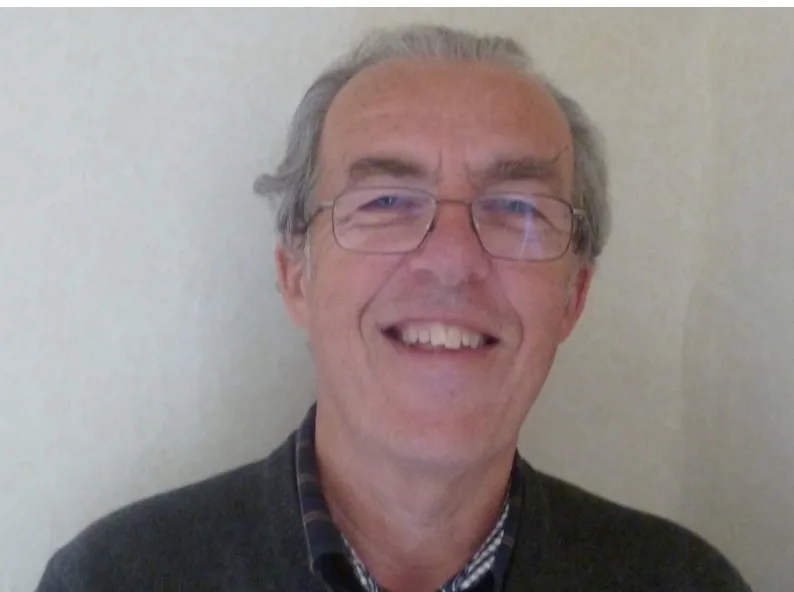
Mike Gibson's story is based on memories of the countryside around his childhood home in Penrith, Cumbria, in the late 1950s, when he was aged between eight and 10. "We would disappear into the countryside for days and nobody seemed to worry about it then."
Mike has always been interested in the countryside and wildlife. "If I heard a rustle in the roadside verge I always wanted to know what was causing it. I never really lost that that childhood innocence."
Nowadays Mike enjoys sharing his enthusiasm for wildlife with youngsters. "I work for various conservation organisations trying to engage younger generations, doing pond dipping and things like that. People say small children are obsessed with screens, but if you put real animals in front of them, they are still intensely curious."
BBC Countryfile Magazine New Nature Writer of the Year 2021 Runner-up: Natalie Robins, Gloucestershire
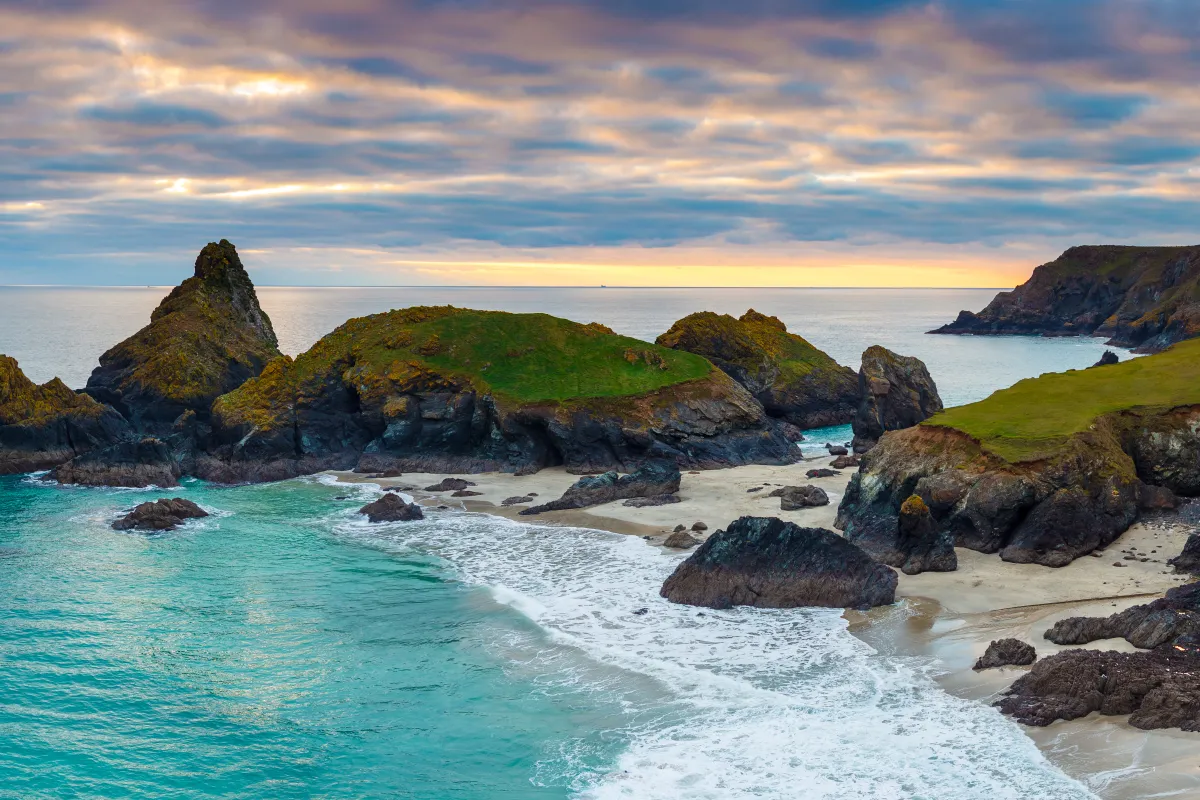
Kynance Cove
I feel trapped, like a bird, stuck in its cage, unable to fly.
My first captor, a global pandemic. My second, cancer.
As others slowly shift back to normality, I am stuck here on pause, fighting another disease from my bedroom.
I live in cycles, dictated by the chemicals pumped into my body.
Chemo, rest, recover, chemo.
That’s how the pattern goes.
And, as the weeks go by, I sit here, full of fear, for the life I’m worried I won’t live.
Full of frustration, for the life I’m not currently living.
I want to be out there, exploring the world.
I crave the sound of the waves.
The feel of sand between my toes.
Road trips on winding lanes.
The journey as sweet as the destination.
I miss all of this so much it hurts.
It makes me want to call out in anger.
Scream until my lungs ache.
Why me? Why this? Why now, so early?
And then I hear something.
A noise outside my window.
The sound of a seagull.
And, in an instant, I’m right where I need to be.
Kynance Cove.
Stripped to my swimming costume.
Bare skin whipped by the wind.
Sand thrashing against my body.
The pain exhilarating.
My feet take on a life of their own.
Running amongst the rocks.
Dancing in step with the sand.
As if they know every groove by heart.
I skip and spin and twirl, this way and that.
All the while, laughing and screaming in delight.
I am a child all over again.
Not a care in the world.
The waves throw themselves at me, over and over.
Enticing me in.
And so, there’s nothing for it.
I sprint gaily for the ice-cold waters.
Sinking my body back onto the blanket of blue.
Letting the currents move me to the rhythm of the ocean.
And, in this moment, I feel held.
Enveloped by this giant body of water.
Curled into a cove, lapping against my body.
Holding me up. Holding me close.
Just holding me, full stop.
It is only a moment.
A memory of holidays gone by.
But it is everything.
That is the power of memories formed in nature.
They never leave you. They’re always there.
Ready for when you need them most.
Sitting there, waiting to transport you back.
Without you having to move an inch.
And their biggest gift of all?
They give you something to bring back to the present.
They give you hope.
Hope for a time when this is all over.
Hope for a time when you hear the sound of a seagull and see it soaring above you.
Circling the waters you drift happily in.
Free, uncaged, flying high.
What the judges said
A potent reminder of the ability of the natural world to lift us, albeit momentarily, from suffering, and of the evocative, transcendent power embedded in the cry of a gull.
Katharine Norbury
Original in form, true in emotion, yet never self-pitying – a powerful meditation on the importance of memories of the natural world at a difficult time.
Stephen Moss
About the writer

Natalie Robins was diagnosed with cancer in March 2021. Confined indoors, she found herself dreaming of a recent holiday on Cornwall. "It was the first time I'd ever been, but I absolutely fell in love with it," she says. "Kynance was my favourite beach. There's something about the coast – I really do find it therapeutic."
Natalie lives in Cheltenham – 'A really nice place to grow up' – surrounded by fields and hills. She also enjoys spending time in woodlands. 'I absolutely love the Forest of Dean… we usually park up somewhere completely random and go and explore.'
She is a content writer, working for the family recycling business. Before that she worked as a dog walker in west London. "I've never written anything creative – well, not for years. Life just got in the way. Everything went on the backburner.
"I am really thankful for your competition, because it got me started on writing poems for each stage of my journey… some of them are funny, some emotional. It's been good to not keep things in… it's also shown some of the lighter side. It's not all doom and gloom."
Natalie has now completed chemotherapy and surgery and is beginning to look forward to life after treatment. "Going through cancer knocks you and makes you think about what you want from life," she says. "I want to get back into swimming as part of my recovery. And my dream would be to get some writing published."
And, of course, she's planning to return to Cornwall as soon as she can.
Highly Commended: June Elford, Isle of Wight
Wild Wight garden
The garden is my haven. Recovering from a fall and fractured hip, I can’t walk along the lane to the ford. Instead I’m seeing things in the garden I’d never noticed before as we move from winter into spring and summer.
A snowdrop, a bell-like flower on a delicate stalk, pushes towards a cold pale sky, a harbinger of spring. Crocuses follow in their flamboyant yellow and purple colours, the Lenten rose, Helleborus orientalis, pink and plum-purple with green leathery leaves. As we brave February rain and March winds, I begin to notice the clouds. It’s the time of the year to spot nacreous clouds catching the light, when the sun is below the horizon an hour or two before the sun rises or after it sets.
A robin sings his vigorous song, his wife has already made a nest in a large shrub in the garden while her mate guards his territory for any intruders. Sadly I haven’t seen a song thrush or heard one sing for some time but a blackbird is uttering a shrill pink-pink-pink warning when he sees a neighbour’s cat. Next door jackdaws are busily building a nest of twigs in the cottage chimney. From my bedroom window I notice the trees below the Norman castle are turning green, soon I won’t be able to see the window on the walls from which King Charles tried to escape in 1648.
Nightly frosts deter gardeners from buying the bedding plants that supermarkets are selling to tempt the unwary gardener. But the weather is warm enough to fork around plants and when I start with a bamboo in the Japanese part of the garden, my trowel unearths an egg! So I live on Dinosaur Isle, the Isle of Wight, and aged 90 could imagine this was a reptile’s egg. I turn to my friend Google who tells me that foxes steal eggs and bury them to eat later. Mystery solved; a neighbour keeps chickens. Will the culprit return to retrieve the egg?
At last the weather improves after what the weather people tell us was the wettest spring and the garden is full of flowers to make up for lost time. I’ve bought a friend a Judas tree for her birthday and it sits in a pot under the apple tree. To my horror, I find the leaves are suddenly full of holes: a leaf-cutter bee has been busy cutting out pieces to line its egg cells.
There are mice in the garage. I’d left a bag of bird seed on the bench and the little grey creatures have been gorging on the food. We get a humane trip-trap, bait it with peanut butter and five are caught. Take the mouse at least 500 metres away, the instructions on the box read, so each morning my carer takes the unfortunate mouse down the street, and over to the other side of the ford.
The hawthorn at the bottom of the garden and the robin’s favourite tree is in full flower. When I was a child, it was believed to be bad luck to pick the branches and bring them indoors. But in the language of flowers, it’s a symbol of good hope, because in spring the green hedges shows that winter is over.
Last night, when I couldn't sleep, I saw low rolls of Stratocumulus undulatus radiatus drifting silently through the night air. But today the sky is clear and the garden shimmers in the sun, bees gorge on the flowers. A white-tailed eagle, Britain's largest bird of prey, one of six introduced to the Island since the 1700s, glides effortlessly overhead. Sparrows scatter into the hedge, a blackbird skitters across the lawn.
Magazines and television are featuring holidays and though I won’t see the bonnie banks and braes of Loch Lomond again, I live on an island of cliffs and forests, green valleys, broad-backed downs and sandy bays. A guide printed in 1889 said of the Isle of Wight‚ “Few places are celebrated and praised for the beauty of both land and coastal scenery.“ It is a rare place, a gem and my garden is my haven.
What the judges said:
Stephen Moss: "A charming and delightful account of making the most of being in lockdown, simply by appreciating nature in a garden."
Katharine Norbury: "A beautifully observed recollection of the microcosm at our doorstep, the wealth of the natural world, and the variety of wildlife which passes daily through our gardens when we are still enough to take heed."
Highly Commended: Rhiannon Law, Glasgow
Winter on an urban burn
Control-Alt-Delete. The three-finger-salute to my lunch break. I leave the laptop sleeping on the dining room table and escape my makeshift office. No need to set up an automatic email reply as I won’t be going far.
That said, I am dressed for an expedition as this short trek is not without its risks. I pull rubber snow grips over my boots to guard against a slip that, with my hypermobile joints, will inevitably lead to a dislocated knee. The rush of freezing air hits me as I open the front door, blasting away the first hint of a headache. As I step outside and lift my chin, snowflakes land on screen-weary eyelids. Following preparation akin to a climber scaling Everest, I head out into the deep snow on a journey that will take around five minutes at a slow trudge. Embarking down the path, a warm feeling envelops me and anxiety dissipates. For an hour, I am free.
I make for the path along the road that separates the cosy cottage flats from the wilderness; the overgrown banks of the Auldhouse Burn. So utterly lacking in charm to most that its only use is for fly-tipping by the houses on either side. Fly-fishing is reserved for the prettier parts of the river.
The long-tailed tits must like the burn well enough. They stick to the wild side of the road, never venturing towards the immaculate gardens a short teaspoon-shaped flight away. As I crunch beneath the bare branches that overhang the path, a frisson of excitement heralds the arrival of a flock of these sociable birds. They create puffs of white powder as they land in the branches above me before taking off again within seconds, calling each other with a sound like the insistent beep of a text message alert. The sole trace is a shimmering blizzard in their wake and the accompanying feeling that there is always something moving through this place if I pause long enough to look.
In the 18th century, thousands of local people depended on the unassuming burn for employment in the water-driven textile industry. The softness of the lime-free water made it perfect for processing cloth. There were bleachfields in which they laid the fabric out in the sun to whiten. Now locals seem dependent on the river for dumping shopping trolleys and as a place to walk their dogs.
Despite this, nature still relies upon its flow. In spring, the dippers will try to raise a brood under the bridge in the nearby park. The kingfisher will appear in a flash of electric blue but never pause long enough for a photo. Otters will be spotted frolicking in the shallows, although probably not by me. The wildlife here may be omnipresent, but my sense of timing is often absent.
Reaching the bend in the road, I am as far away from the houses as possible and staring into the expanse of the field facing the ice-crusted burn. A shroud of winter already covers the weeds and long grasses, but all life seems further silenced as another snow shower begins to fall. As I turn my face to the sky, something moves at the corner of my vision. A rust-coloured rivulet running through the monochrome landscape on the other side of the river. A fox. Fantastic. Somehow aware of my gaze, he pauses on the bank opposite to where I am standing. Snowflakes drift down and land on his nose, unmelting. Amber eyes focus on me. Breath mutually held. Neither one of us moves for a time. It is probably for a matter of minutes but, for me, it feels like blissful hours. The moment passes, and he trots away, leaving me shaking with excitement instead of shivering in the cold. There is always something moving through this place if I pause long enough to look.
Numb fingers tug at my sleeve, trying to roll up the many layers of clothing to make my watch face visible. An hour and ten minutes have elapsed. Time has a habit of slipping away when I escape to this spot. Still, my freezing feet refuse to turn for home. Just ten minutes more. I might spot something else. Maybe an automatic email reply would have been a good idea after all.
What the judges said:
Stephen Moss: Rooted in reality, yet with some wonderful evocations of chance encounters with urban nature on a winter’s day.
Katharine Norbury: An earthy, rooted account of the transformation possible when we step away from our computer screens and go outside, and of the timelessness of the natural world just a few minutes from our doorstep.
Highly Commended: Adele Prince, London
Walking the Waterlink Way
Turning right, I can reach the park in less than a minute. The heavy metal railing, its green paint chipped to camouflage patches, holds us back from the concrete-edged river. In recent weeks passers-by have paused here to admire the showy plumes of the Mandarin duck, the male strutting and posturing for our delight. Today, the river rushes by quickly, detritus carried by the heavy rain, bobbing under the bridge. The path falls away to a wooden platform, where a woman crouches next to two toddlers, bright strokes of colour in their waterproofs, their cargo bike parked nearby.
I continue in the direction of Catford Bridge, passing under the magnificent Lewisham Elm, one of the few remaining mature elm trees in London, a status marked by a plaque which also informs us that this is one of the ‘Great Trees of London’. To my left is a sapling, grown by a local resident, from a seed dropped by our ‘Great Tree’, and planted here in recent months, its slender form enclosed protectively in a metal guard.
Taking the trail path, I notice how incredibly lush everything has become in just one week. The scent is sweet, the beginnings of the elderflower catching my throat as I pause to enjoy a wren that shouts out as he cuts in front of me. Through the trees I catch a glimpse of the bowling club, the green pristine and bouncy-looking, a citrus-tinged duvet dropped neatly next to the raised trainline to Sevenoaks, a high fence keeping out all but a snoozing fox, who takes advantage of this safe resting place.
I give a sideways glance to the river as I pass the bridge here, a spot popular with the kingfisher earlier in the year and somewhere I hope to catch sight of him again. This bird takes me by surprise every time, sitting atop an ugly curve of concrete, built here to slow the river as it reappears from under a car park – I often wonder if the neon flash I see takes flight over the DIY store, or does it light its own way beneath our feet? For now, I take time to watch the Little Egret, lifting and dipping its foot to disturb the silt, long yellow toes opening and closing as, above water, an elegant neck supports a head balanced by a dagger-sharp black beak and two wispy feathers.
Once under the South Circular and through the car park, the path starts to feel more wild, overhanging trees showing the last petals of blossom, shiny leaves stretching awake. I lean over the bridge to hear the post-rain crash of the confluence, a delicious whoosh where the rivers Pool and Ravensbourne meet. I pass a bench, one of many installed here in the winter, then bare and plastic-wrapped, now almost hidden, nestling in a pillow of greenery, cow parsley dipping to touch the seat.
A year or so of daily exercise has changed this place, paths now spilling onto the grass, desire lines cut deep to accommodate those who seek space and air here at busier times. I take the ‘new’ paths, preferring to skirt the longer grasses, reaching out now and then to feel the velvety remains of willow buds, mostly now fallen. A passenger train trundles by next to me, empty but for a couple of masked faces, staring through me sleepily as they head towards central London. I pause, a favourite spot, where trees, self-seeded alongside the railway line, have reached through, their branches crossing the metal divide. Like creamed potato through a masher, bark oozes sensually through the criss-cross fence, the two melding together inseparably.
This is where I head for home, a turning point that gives me an hour of walking, an hour of recharging and retuning. I could take a left on leaving the house, but the river pulls me, the chance of an encounter, a flash of blue and a rusted belly, these moments punctuating long days and carrying me through a strange year.
What the judges said:
Stephen Moss: This really conveys the power of ordinary – and some far less ordinary – encounters with nature, in an initially unpromising urban setting.
Katharine Norbury: A warm and timely reminder of the wildness of South London and of the ability of the natural world to transform even the most unlikely nooks and crannies; of the vital importance of holding those spaces open so that they buzz with life.
Highly Commended: Samantha Pyrah, East Sussex
Kayaking on the River Rother
Getting up and out the door before you have a chance to think about it is the knack. Not twenty minutes ago I was tangled in a duvet, the weight of the day already beginning to settle on me. Now I am floating on a mirror of blue sky, with fluffy white clouds far, far below. I savour the illusion for a moment, then spear my paddle into the water, pull and glide.
Suddenly, a blue ball is hurled, its aim straight and true. It glints past, a mere inch from the water’s surface, then curves sharply to land hidden among the reeds. Later, I see it perched on a willow branch – more beak than body, with the hunched shoulders of one used to waiting.
Hunkered down in a kayak, you get a swan’s eye view of river life. Needle-bodied damselflies hover like streaks of blue biro. Pond skaters dance on the water. House martins swoop for insects, close enough for me to hear the whir of their wings. Not seen but heard, a sedge warbler tries out a new set of bleeps and buzzes, worthy of any acid house DJ.
At this point on its journey, the river – my river – flows sedately through a wide, flat-bottomed valley of lush pasture, crisscrossed with ditches and canals. A parade of pylons march along its southern bank. I have walked here countless times, but last spring, I decided to take to the water. The novelty of exploring my local area some way other than on foot provided a distraction from the fear, uncertainty and anxiety I felt as the pandemic unfolded. But it became much more. A daily ritual of sanctuary and discovery. This is where I learned to slow down, to watch and listen. To be not apart from nature, but a part of it.
The biophilia hypothesis, proposed in the early 1980s by Edward O. Wilson, suggests that humans have an innate need to connect with the natural world. We are moved, soothed and uplifted by nature’s colours, textures and soundscapes. As I immersed myself in the river’s comings and goings while the season’s unfurled, I knew this to be true. I felt a visceral need to keep coming back, to see what happened next – what would hatch or bloom, what would emerge from murky depths or arrive from distant shores?
I followed the river’s fortunes through to late autumn, when my paddle-calloused hands and bare feet got so numb one morning it took until lunchtime to thaw out. I reluctantly hung up my lifejacket for the winter. When I walked along the river after that, it felt like a stranger.
But now I’m back, dragging my kayak through long, dew-soaked grass to the river’s edge, sending clouds of craneflies in to the air, their legs dangling like cotton threads. Like the British spring, I’m a little later than planned and the river is already a riot of life. The grey-green reeds and rushes that crowd the banks have made way for more colourful spectators: purple loosestrife, flag iris and meadow buttercups. The breeze carries the heady scent of meadowsweet and the call of the cuckoo that has returned to the same bend on the river.
The water feels viscous and velvety today. It pushes back against my paddle strokes as I nose the kayak upstream, weaving between yellow water lilies that stand to attention on dinner-plate-sized pads, the wind lifting them like sails. A Blue Emperor dragonfly alights briefly on the bow of my orange kayak, inadvertently recreating the vibrant colour scheme of the kingfisher. His two sets of wings are like stained glass windows, his eyes like mirrored flight goggles. He is a thing of wonder.
I float silently with the current, allowing the kayak to bump softly into the bank and come to rest. It’s almost time to head home, but first I’ll sip coffee from my flask and cherish the taste of freedom.
Stephen Moss: A new and refreshing take on nature seen from a different perspective, on a watery journey.
Katharine Norbury: A refreshing account of the teeming life of a river from the perspective of a kayaker. A bright reminder that there are many ways to feel at one with the natural world.
BBC Countryfile Magazine New Nature Writer of the Year 2021: Meet the judges
Stephen Moss
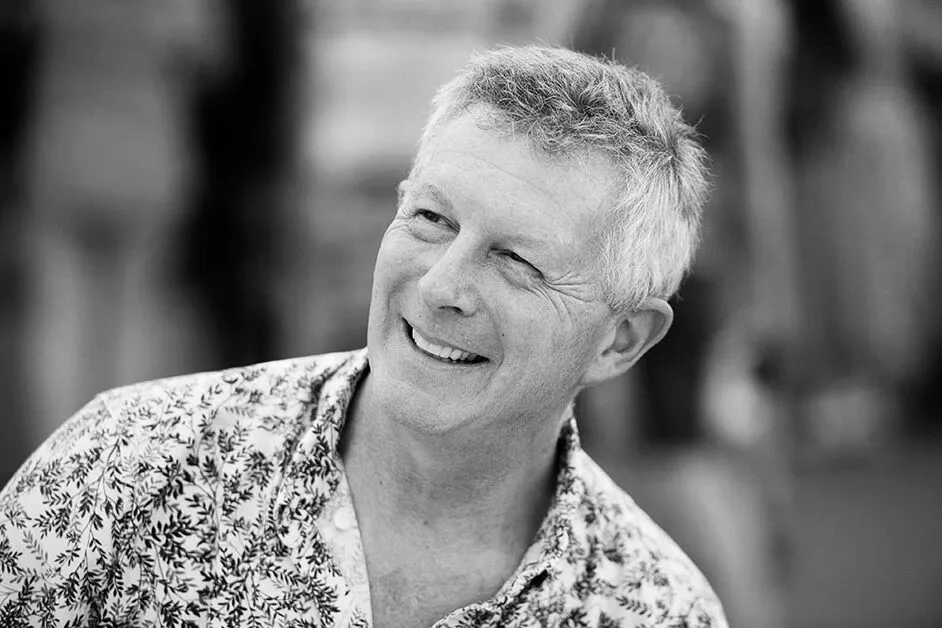
One of Britain’s leading nature writers and broadcasters, Somerset-based Stephen’s many books include The Swallow: A Biography, which was longlisted for the 2021 Wainwright Prize for UK Nature Writing. He teaches nature and travel writing at Bath Spa University.
Katharine Norbury

Trained as a film editor with the BB, Katharine has worked extensively in film and television drama. She is the author of the powerful memoir and travelogue The Fish Ladder (Bloomsbury, 2015), for which she was named the Observer's rising star in non-fiction. She is the editor of the anthology Women on Nature: : 100+ Voices on Landscape, Place and the Natural World (Unbound, 2021).
Joe Pontin
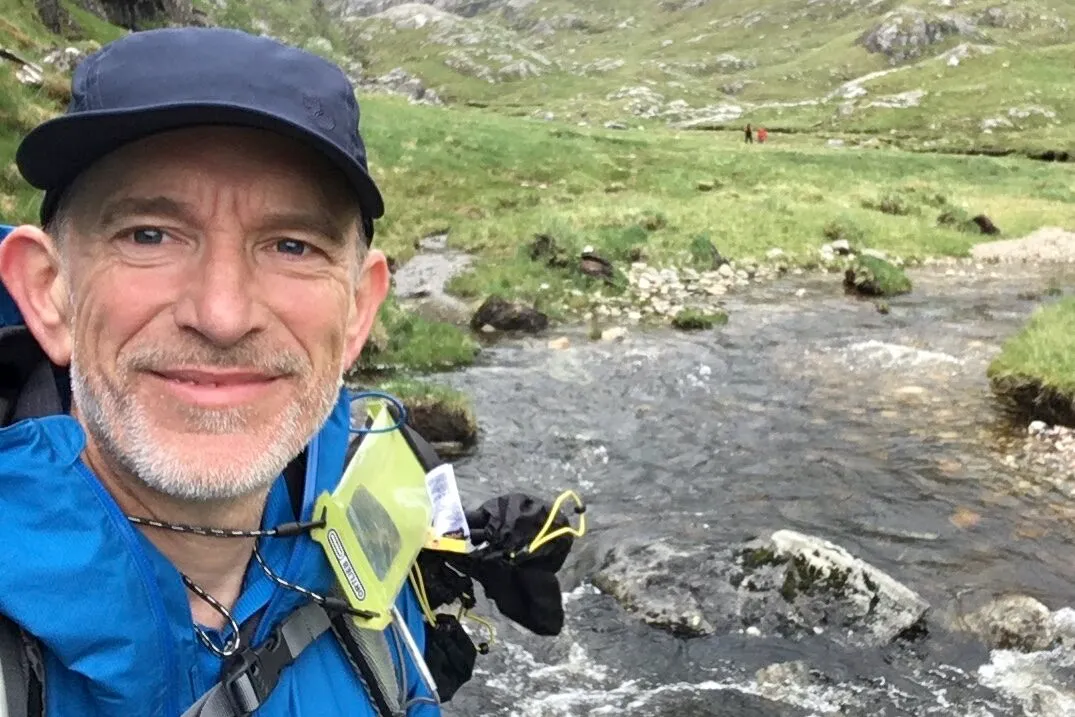
BBC Countryfile Magazine’s features editor lives with his family in North Somerset. An experienced editor and writer, Joe enjoys good stories and outstanding writing in all its forms. He was chair of the judging panel.

Anita Sethi
Writer, journalist and broadcaster Anita is the author of I Belong Here: A Journey Along the Backbone of Britain, (Bloomsbury Wildlife, 2021), which was shortlisted for the Wainwright Prize for UK Nature Writing.
